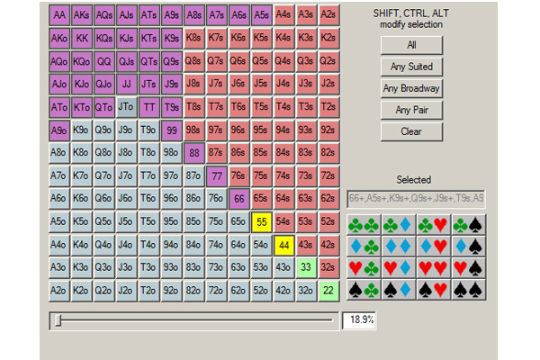We also use the Selection Sort Algorithm to sort the Poker hand by the rank values of each card Previously discussed: The Selection Sort Algorithm was discussed in the array lecture notes. Hand Selection As any seasoned poker player can tell you, what you choose to play is just as important in a poker game as the manner in which you play it. New players often make the fatal mistake of overestimating the value of their hands, especially in Texas Hold'em, which this section will focus on. Preflop hand selection is vital. The decision you make most often during a poker game is whether to fold or play the hand dealt to you. Live poker players receive around 25-35 hands per hour, online poker players receive 60 hands per hour (and that's per table, as of course online players can multitable).
Starting Hand Selection:Chen Formula : Sklansky Starting Hand Groups
In Texas Holdem, it is important to have good starting hand selection. This is important as it prevents you from entering pots with sub-standard hands, which could eventually lead to you losing a lot of money in the process.
'Starting hand selection' is simply choosing the good hands over the bad, and thus folding the bad hands when you get them.
It is true that any hand can win in Texas Holdem (or poker in general for that matter), but the fact of the matter is that some hands will win more than others. So if we stick with the good hands, then we should see better results in the long run.
Basic starting hand selection.
Top tier starting hands - top 2% of starting hands.
Good Texas Holdem starting hands are typically hands like big pocket pairs and big connecting cards. So some of the top starting hands would be:
- AA
- KK
- AKs
The little 's' indicates that the cards are suited, which will increase the value of the cards because it makes it more likely that they will be able to make a flush compared to if the cards were not suited.
This is obviously the top tier when it comes to starting hands, and if we were to only ever be dealt these starting hands we would be making a lot of money. In fact, if we folded every other hand that we were dealt and only played these hands, there is a fair chance that we would be winning money in the long run. But this would only work at the lower limits where other players probably wouldn't be aware that we only play premium hands.
Second tier starting hands.
If we only ever played with this elite group of cards, we would be folding numerous hands along the way and missing out on other opportunities to win money. Even though these are the cream of the crop when it comes to starting hands, there are still other great hands out there that can win us a lot of money in the long run if we play them.
Such hands are:
Razz Poker Hand Selection
- AK
- AQs
- AJs
- JJ
- TT
This gives us another 6 starting hands that we can play with, increasing the number of pots that we will be entering. Although these are not as good as the first set of premium hands mentioned, they are still great starting hands that should help us to win money. Blackjack billy night light novel.
Top 10 Texas Hold'em starting hands.
Now if we stick with this set of 10 starting hands we should definitely by on the right track to winning some money from poker. So for any player new to the game you should try your best to stick to the following top 10 hands (also throwing in some of top 20 hands if you have good position):
- A A
- K K
- Q Q
- A K (suited)
- A Q (suited)
- J J
- K Q (suited)
- A J (suited)
- A K
- T T

- A T (suited)
- K J (suited)
- A Q
- 9 9
- Q J (suited)
- K T (suited)
- 8 8
- Q T (suited)
- A 9 (suited)
- A J
These hands can be played profitable from most positions by experienced players, but you should only play these hands from late position if there has been no action before you (no betting or raising) if you are still learning the basics.
As your game improves, you can look to open up your starting hand requirements and require more marginal hands like suited connectors. However, if you're new to the game you are better off sticking with the big cards that hit bigger flops and make post-flop play a hell of a lot easier for you.
Starting hand selection and table position.
Your table position should always play a big role in determining the range of hands that you choose to play with.
You should stick to playing much stronger hands from early position than you would from late position.
This means that if you are in one of the early position seats, you should stick to playing the top two tiers of hands and avoid lesser hands like; AQo, AJs, AT, KQs and so on. Conversely, if you are in late position and there has been little action before you, you can afford to play these sort of hands far more comfortably.
Why is table position important in starting hand selection?
If you are one of the first to act in a hand, you are going to be at a serious disadvantage to the rest of the players who are acting after you. Therefore, to avoid making things worse, you do not want to be entering a pot with anything less than a premium hand.
Acting first means that you are going to have little information on your opponents. If you are playing with a mediocre hand, it is likely that you are going to be in a spot where you have no idea whether you have the best hand or not. These situations are the ones that lose you the most money in poker, so avoid falling into them by playing stronger hands from early position that will make it easier to determine whether or not you have the best hand.
The importance of starting hand selection.
Starting hand selection is key because it helps to save us from sticky situations post flop, especially if we are new to the game.
Starting hand selection example.
Say for example we are not exercising very good starting hand selection and we decide to call a raise with K T. The flop then comes K 8 2 giving us top pair, which looks like a very strong hand. Our opponent bets into us and we decide to call, because after all we do have top pair.
The turn comes a 4, and our opponent bets once again. We have top pair and we call seeing as we are still happy with the strength of our hand.
The river comes a 7, and our opponent bets into us one final time. We make the call with our top pair thinking we might still have the best hand, but our opponent turns over K Q.
He also has a pair of Kings but he has the higher kicker, so he takes down the pot.

Starting hand selection example evaluation.
This is an all too common problem for poker beginners, and it could have been so easily avoided by being a little stricter with our starting hand selection. Having top pair is great, but all so often an opponent can easily beat it with a better kicker. This is why it is important to have two big cards instead of one, because the size of our kicker can play a vital role in determining who the winner of the pot will be.
You are dealt two cards in Texas Hold'em; make sure that they are both good cards before you enter a pot. An ace with a low kicker is going to lose you more money than it wins.

Don't be tempted to call raises or enter pots with hands like A4 (rag aces) or K7, because they will just get you into more trouble than they are worth. Make sure that you are the one with the better kicker every time and take the money from the players who are entering the pots with weaker hands than you.
It is actually reasonable to bring down our starting hand requirements if we have good position. Position will give us an advantage over our opponents if we are last to act, so we do not necessarily have to have such a strong hand to play with because will be obtaining information from the way our opponent plays because they will be acting first.
This information and knowledge of our opponent's hand from the way they play will compensate for the fact that our starting hand is a little weaker than normal. However, we still have to be prepared to fold as having position does not guarantee that we will win the hand, it simply gives an advantage. It is advised that you only enter pots with weaker hands in position once you have become a little more experienced.
Conclusion.
As you continue to play poker and gain experience from the game, it is a good idea to start expanding your starting hand requirements and experimenting here and there. However, if you are new to the game it is strongly advised that you stick to the big cards so that you give yourself the best opportunity to win money from poker.
If you are entering pots with a poor hand, you should be expecting to see poor results.
Go back to the awesome Texas Hold'em Strategy.

- A T (suited)
- K J (suited)
- A Q
- 9 9
- Q J (suited)
- K T (suited)
- 8 8
- Q T (suited)
- A 9 (suited)
- A J
These hands can be played profitable from most positions by experienced players, but you should only play these hands from late position if there has been no action before you (no betting or raising) if you are still learning the basics.
As your game improves, you can look to open up your starting hand requirements and require more marginal hands like suited connectors. However, if you're new to the game you are better off sticking with the big cards that hit bigger flops and make post-flop play a hell of a lot easier for you.
Starting hand selection and table position.
Your table position should always play a big role in determining the range of hands that you choose to play with.
You should stick to playing much stronger hands from early position than you would from late position.
This means that if you are in one of the early position seats, you should stick to playing the top two tiers of hands and avoid lesser hands like; AQo, AJs, AT, KQs and so on. Conversely, if you are in late position and there has been little action before you, you can afford to play these sort of hands far more comfortably.
Why is table position important in starting hand selection?
If you are one of the first to act in a hand, you are going to be at a serious disadvantage to the rest of the players who are acting after you. Therefore, to avoid making things worse, you do not want to be entering a pot with anything less than a premium hand.
Acting first means that you are going to have little information on your opponents. If you are playing with a mediocre hand, it is likely that you are going to be in a spot where you have no idea whether you have the best hand or not. These situations are the ones that lose you the most money in poker, so avoid falling into them by playing stronger hands from early position that will make it easier to determine whether or not you have the best hand.
The importance of starting hand selection.
Starting hand selection is key because it helps to save us from sticky situations post flop, especially if we are new to the game.
Starting hand selection example.
Say for example we are not exercising very good starting hand selection and we decide to call a raise with K T. The flop then comes K 8 2 giving us top pair, which looks like a very strong hand. Our opponent bets into us and we decide to call, because after all we do have top pair.
The turn comes a 4, and our opponent bets once again. We have top pair and we call seeing as we are still happy with the strength of our hand.
The river comes a 7, and our opponent bets into us one final time. We make the call with our top pair thinking we might still have the best hand, but our opponent turns over K Q.
He also has a pair of Kings but he has the higher kicker, so he takes down the pot.
Starting hand selection example evaluation.
This is an all too common problem for poker beginners, and it could have been so easily avoided by being a little stricter with our starting hand selection. Having top pair is great, but all so often an opponent can easily beat it with a better kicker. This is why it is important to have two big cards instead of one, because the size of our kicker can play a vital role in determining who the winner of the pot will be.
You are dealt two cards in Texas Hold'em; make sure that they are both good cards before you enter a pot. An ace with a low kicker is going to lose you more money than it wins.
Don't be tempted to call raises or enter pots with hands like A4 (rag aces) or K7, because they will just get you into more trouble than they are worth. Make sure that you are the one with the better kicker every time and take the money from the players who are entering the pots with weaker hands than you.
It is actually reasonable to bring down our starting hand requirements if we have good position. Position will give us an advantage over our opponents if we are last to act, so we do not necessarily have to have such a strong hand to play with because will be obtaining information from the way our opponent plays because they will be acting first.
This information and knowledge of our opponent's hand from the way they play will compensate for the fact that our starting hand is a little weaker than normal. However, we still have to be prepared to fold as having position does not guarantee that we will win the hand, it simply gives an advantage. It is advised that you only enter pots with weaker hands in position once you have become a little more experienced.
Conclusion.
As you continue to play poker and gain experience from the game, it is a good idea to start expanding your starting hand requirements and experimenting here and there. However, if you are new to the game it is strongly advised that you stick to the big cards so that you give yourself the best opportunity to win money from poker.
If you are entering pots with a poor hand, you should be expecting to see poor results.
Go back to the awesome Texas Hold'em Strategy.
Poker Hand Selection Chart
Comments